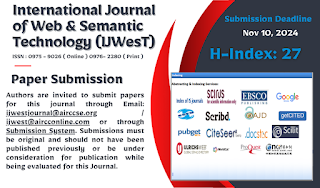Call for Papers..!!!
International Journal of Web & Semantic Technology (IJWesT)
ISSN : 0975 - 9026 ( Online ) 0976- 2280 ( Print )
Web page URL
Article:
Semantic-Driven e-Government: Application of Uschold and King Ontology Building Methodology for Semantic OntologyModels Development
Authors
Jean Vincent Fonou-Dombeu1,2 and Magda Huisman2, 1Vaal University of Technology, South Africa and 2North-WestUniversity, South Africa
Abstract
Electronic government (e-government) has been one of the most active areas of ontology development during the past six years. In e-government, ontologies are being used to describe and specify e-government services (e-services) because they enable easy composition, matching, mapping and merging of various e- government services. More importantly, they also facilitate the semantic integration and interoperability of e-government services. However, it is still unclear in the current literature how an existing ontology building methodology can be applied to develop semantic ontology models in a government service domain. In this paper the Uschold and King ontology building methodology is applied to develop semantic ontology models in a government service domain. Firstly, the Uschold and King methodology is presented, discussed and applied to build a government domain ontology. Secondly, the domain ontology is evaluated for semantic consistency using its semi-formal representation in Description Logic. Thirdly, an alignment of the domain ontology with the Descriptive Ontology for Linguistic and Cognitive Engineering (DOLCE) upper level ontology is drawn to allow its wider visibility and facilitate its integration with existing metadata standard. Finally, the domain ontology is formally written in Web Ontology Language (OWL) to enable its automatic processing by computers. The study aims to provide direction for the application of existing ontology building methodologies in the Semantic Web development processes of e-government domain specific ontology models; which would enable their repeatability in other e-government projects and strengthen the adoption of semantic technologies in e-government. The research would be of interest to e-government system developers as well as the Semantic Web community, as the framework and techniques employed to develop the semantic ontology models might be repeated in other domains of knowledge to build ontologies.
Keywords
E-government, Semantic Web, Ontology, Ontology Building Methodologies, Description Logic,Development Projects, OWL, Protégé
Paper URL
Volume URL





Comments
Post a Comment